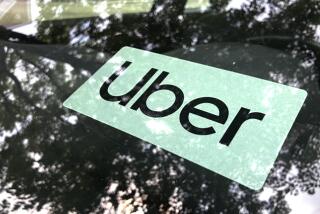London Cabbies Have It : ‘The Knowledge’
- Share via
LONDON — This city’s 15,000 taxi drivers have won the battle of “The Knowledge.”
Never at a loss for words, the drivers of the famous black cabs have talked the government out of plans to break their centuries-old monopoly by arguing that their service is the finest in the world.
The victory guarantees the survival of The Knowledge, the arduous two-year process in which aspiring cabbies learn every street and landmark within six miles of central London.
“The Knowledge is more difficult than a university degree,” said a pupil at Beejays taxi school, where “Knowledge Boys” meet each day to recite street names by the dozen and chart routes across the capital with maps and bits of string.
“Whilst you’re doing The Knowledge you must eat, drink and sleep The Knowledge,” said another. “It must consume you for the two years.”
Knowledge Boys earn no pay for the time they spend riding around the capital on mopeds and memorizing the 468 set routes laid down in the “Blue Book,” the taxi drivers’ bible.
Many find themselves racing to pass their exams before their savings run out. Breakdowns and divorces are not uncommon.
But Knowledge Boys at Beejays, who meet for four hours each afternoon in a rundown hall in East London, are spurred on by the prospect of a secure job with the freedom to work whatever hours they like.
Many come to escape dead-end jobs or to acquire a safety net against layoffs. Milkmen and dockers rub shoulders at Beejays with a former policeman, a university lecturer and a banker.
“The cab trade has always been and will always be a second chance,” Phil Phillips, Beejays’ cigar-smoking chief instructor, said. “You’ve got guys here that are in love with London, in love with the job. Every day they go and learn something new.”
About 2,500 applicants embark each year on The Knowledge quest, part of a system that traces its origins to the 17th century and which is still unique to Britain.
“There were lots of highwaymen in those days, and people were often taken for more of a ride than they expected,” said Harry Feigen, general secretary of the Licensed Taxi Drivers Assn. and a cab driver for 40 years.
“That’s the reason legislation was introduced in the days of Oliver Cromwell. We operate basically by the same rules, except we don’t have horses.”
The system has survived ever since despite changing times, periodic wars with taxi “pirates” and skirmishes with the government, which regulates the entire trade.
Arguing that The Knowledge was a restriction on entry, the government last year proposed ending the black cabs’ exclusive right to “ply for hire”--pick up passengers--on London’s streets.
But after an outcry from cabbies, Transport Minister Michael Portillo announced in May that he was shelving proposals to allow “mini-cabs,” which can at present be summoned only by telephone, to compete with black cabs in plying for hire.
The government’s U-turn was warmly welcomed at Beejays.
“We were all worried out of our skins. We thought we’ve done all this for nothing,” said Knowledge Boy Andy Collins.
“Nobody in this trade wants lower standards, even the Knowledge Boys,” said instructor Doug Sadler. “If you made getting the badge easier, they’d all be up in arms.”
Cabbies say the present system provides a standard of service that could not survive the free-for-all of open competition.
They have to submit their vehicles for rigorous checks every three months and can be ordered off the road for faults as minor as a dirty windshield.
Once qualified, they pay $27,600 to buy a cab or $260 a week to rent one. Equipped with power steering and brakes, the bulky-looking black Hackney carriages are specially designed for turning sharply and maneuvering in heavy traffic.
Cabbies have their own clubs, restaurants and cafes--as well as their own argot, some of it based on Cockney rhyming slang.
“Sherbet dab” is a cab, city gents are known as “bowlers” and newcomers are called “butter boys” because each is “but a boy.”
London’s cabbies say The Knowledge and the way of life are here to stay, in spite of periodic talk of government reform.
“The licensed cab trade is very well-respected. There doesn’t seem to be another service anywhere in a major city like it,” Feigen said.
“Why spoil something that’s as good as you’re going to get?”
More to Read
Sign up for Essential California
The most important California stories and recommendations in your inbox every morning.
You may occasionally receive promotional content from the Los Angeles Times.













